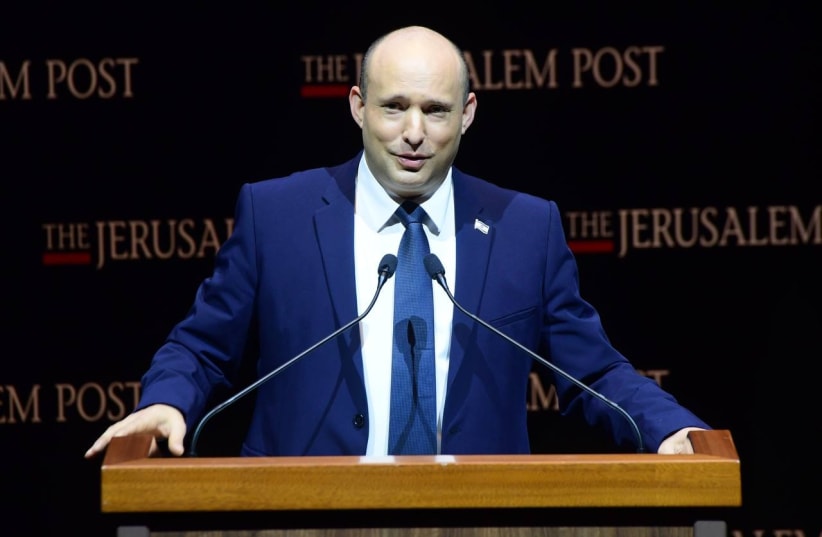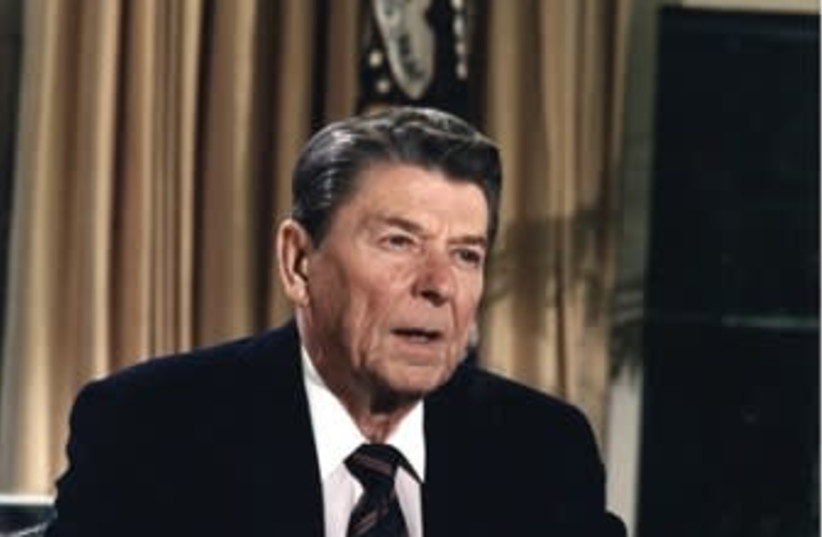Former US president Ronald Reagan’s “Star Wars” program is Prime Minister Naftali Bennett’s model in countering the Iranian nuclear threat, Bennett said ahead of meeting parties to the Iran deal at the UN Climate Conference in Glasgow this week.
In an interview with The Times released as he headed to Scotland on Sunday, Bennett said he plans on “outspending Iran” and likened the Israel-Iran conflict to the Cold War between the US and the Soviet Union.
“The parallel is what Reagan did,” Bennett said. “Reagan didn’t have to bomb Moscow.”
In 1983, Reagan announced the Strategic Defense Initiative, nicknamed “Star Wars,” to develop a defense system against ballistic strategic nuclear weapons. Soviet attempts to compete with American military superiority crippled the USSR’s economy and contributed to the end of the Cold War.
“Iran is a rotten regime,” Bennett said. “They can’t even supply clean water to their citizens but invest their resources in nuclear development.”
“It’s no secret, Iran is now at their most advanced point of the capability to enrich uranium,” he said.
Israel’s “strong [economic] growth, beyond increasing prosperity for Israelis, has allowed us to massively invest in strengthening our military capabilities, both offensive and defensive capabilities,” Bennett said.
“We will work against them, using all our energy, all our innovation, technology and economy to get to a point where we are a number of steps ahead,” he said.
The IAF has been preparing to train for a strike on Iran’s nuclear program and wants to spend NIS 5 billion ($1.5b.) to confront the Iranian threat. Israel is seeking new bunker-buster bombs that the US Air Force successfully tested earlier this month, as well as the aircraft necessary to carry them, according to recent reports.
Bennett is expected to meet with UK Prime Minister Boris Johnson and French President Emmanuel Macron, whose countries are parties to the 2015 Joint Comprehensive Plan of Action and the negotiations to revive that deal with Iran, restricting its uranium enrichment.
Johnson, Macron, German Chancellor Angela Merkel and US President Joe Biden released a joint statement from the G20 in Rome on Saturday, expressing their “determination to ensure that Iran can never develop or acquire a nuclear weapon.”
They said they share a “grave and growing concern that, while Iran halted negotiations on a return to [the JCPOA] since June, it has accelerated the pace of provocative nuclear steps, such as the production of highly enriched uranium and enriched uranium metal. Iran has no credible civilian need for either measure, but both are important to nuclear weapons programs. These steps have only been made more alarming by Iran’s simultaneously decreased cooperation and transparency with the International Atomic Energy Agency (IAEA).”
They “agreed that continued Iranian nuclear advances and obstacles to the IAEA’s work will jeopardize the possibility of a return to the JCPOA.”
However, Biden maintained he would bring the US to full compliance with the JCPOA, and it would remain that way as long as Iran does the same.
“The current situation underscores the importance of a negotiated solution that provides for the return of Iran and the US to full compliance with the JCPOA and provides the basis for continued diplomatic engagement to resolve remaining points of contention,” the joint statement said.
Israel opposes the JCPOA on grounds that it does not sufficiently limit Iran’s nuclear program, nor do the limitations last long enough, and they do not apply to Iran’s other malign actions in the region, such as its military proxies and ballistic-missile program.
However, under Bennett’s government, Jerusalem has kept its criticism of the Iran deal quieter, focusing more on cooperation with the Western parties to the JCPOA to stop Iran from attaining a nuclear weapon.

